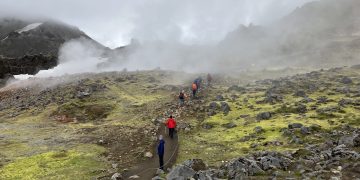Night hiking is a uniquely captivating experience that allows adventurers to explore the great outdoors in a completely different light — or, rather, a lack thereof. As the sun dips below the horizon, the landscape transforms into a quiet, mysterious world where the senses sharpen, the usual chaos of daytime activities fades, and nature’s nocturnal inhabitants come to life. But what exactly makes night hikes so special? In this article, we’ll delve into the allure of hiking under the stars, highlighting the sensory, psychological, and physical elements that make these excursions a thrilling alternative to daytime trekking.
1. The Sensory Experience of Night Hiking
Hiking during the day is often a visual experience — you’re scanning the terrain, enjoying scenic vistas, or looking out over valleys and peaks. But at night, your primary sense becomes hearing and touch. The darkness heightens your awareness of sound, scent, and even temperature shifts. This sensory recalibration is part of what makes night hikes so engaging.
Enhanced Hearing: Without the distraction of bright sunlight and busy surroundings, the sounds of nature become amplified. The rustling of leaves, the distant calls of nocturnal creatures, the gentle murmur of a stream — all become clearer and more pronounced in the dark. Every sound has an intimacy to it, inviting hikers to attune themselves to the rhythm of the wilderness.
Sharp Focus on the Trail: As your eyes adjust to the dark, the surrounding environment softens into shadows, and your focus naturally narrows to the trail. There’s something incredibly grounding about this heightened awareness. With fewer distractions, you become more attuned to each step, each rock, each root underfoot. This close attention to detail fosters a deeper connection to the landscape.
Smell and Air Quality: At night, the air tends to be cooler, and often more crisp. The scent of pine trees, damp earth, or wildflowers is more intense, creating an immersive experience. The cooler evening air also feels refreshing, especially after a warm day hike. The combination of fresh smells and the nighttime breeze amplifies the feeling of being immersed in nature.
2. The Psychological Benefits of Night Hiking

There’s something inherently peaceful about being outdoors at night. The usual noise and chaos of the world recede, leaving behind a sense of tranquility. In fact, night hiking can offer numerous psychological benefits, from reducing stress to enhancing mindfulness.
Calm and Solitude: After the busyness of a typical day, stepping out into the quiet of the wilderness can be remarkably calming. The absence of daylight means that distractions are minimized. You’re less likely to be interrupted by phone calls, social media notifications, or other urban distractions. This solitude allows for deep mental relaxation, helping to lower stress levels and improve overall mental health.
Enhanced Mindfulness: The dark forces hikers to focus on the immediate surroundings rather than the grand vistas or distant landmarks that often dominate daytime hikes. This intense mindfulness in the present moment can help foster a greater appreciation for nature’s subtleties, such as the gentle rustling of a leaf or the rhythmic sound of your breath. Night hiking encourages hikers to slow down and tune into the natural world in a way that is often impossible during the rush of the daytime.
A Sense of Adventure and Wonder: There’s an undeniable sense of excitement and adventure that comes with hiking in the dark. The unknown elements of the trail, combined with the mystery of the night, stirs curiosity and wonder. Whether it’s the glow of bioluminescent fungi, the flash of fireflies, or the sudden appearance of a glowing moon, there’s always something magical waiting to surprise you.
3. The Ecological Marvel of the Night
Many of the earth’s creatures are primarily active at night, and a night hike offers a rare opportunity to witness these fascinating animals in their natural habitat. While daytime hikes may focus on birdwatching or spotting larger mammals, night hikes bring with them a whole new set of wildlife encounters.
Nocturnal Animals: Many animals, from owls to bats to coyotes, are nocturnal, meaning they are most active during the night. Hiking at night gives you the opportunity to see them in action. Imagine the thrill of hearing an owl’s call echo through the trees or witnessing a bat swoop low over a creek. With fewer human distractions, animals may be more likely to behave naturally, giving you an authentic glimpse into their world.
Bioluminescence: Some regions feature bioluminescent organisms, such as fireflies or certain types of fungi, which emit a soft glow at night. This phenomenon is due to the production of light by living organisms through chemical reactions. Witnessing these glowing organisms in their natural environment is an unforgettable experience. Trails with high concentrations of bioluminescent organisms feel almost like a magical experience, transporting hikers to a fairytale-like world.
The Moon and Stars: One of the most spectacular aspects of a night hike is the chance to experience the night sky. Depending on the location, hikers may be treated to a stunning view of stars, planets, or even a full moon casting its light over the landscape. In remote areas with little light pollution, the Milky Way may even be visible in all its grandeur. Stargazing from the top of a mountain or along a quiet trail can be a deeply humbling and awe-inspiring experience.
4. Physical Aspects of Night Hiking
Beyond the psychological and sensory benefits, night hiking also offers certain physical advantages. While it may seem counterintuitive, hiking at night can sometimes be less physically taxing than hiking during the day — particularly in warm weather.

Cooler Temperatures: One of the most immediate benefits of hiking at night is the cooler air. Daytime hikes, especially in summer, can be brutal under the scorching sun. The lack of sunlight at night means that the temperature is generally more comfortable, allowing hikers to cover longer distances or tackle tougher terrain without overheating. The cooler conditions can be especially beneficial for those with heat sensitivity or those trying to avoid the midday sun.
Fewer Crowds: Another physical advantage of night hiking is the relative solitude compared to daytime hikes. Popular trails can become crowded during the day, leading to more traffic, noise, and potential delays. At night, however, many trails empty out, giving you a sense of privacy and space. For those seeking a quiet escape, this solitude is a major draw.
Night Vision Adaptation: With time, your eyes naturally adapt to the darkness, enhancing your ability to see in low light. While the darkness initially limits vision, after about 20-30 minutes of adjustment, your eyes will have fully adapted, allowing you to see shapes and contours of the trail and the environment. This ability to see in low light, combined with a headlamp or flashlight, creates an experience that feels almost magical — a world revealed in shadow and light.
5. Safety and Practical Considerations
While night hiking is an incredibly rewarding experience, it’s not without its challenges. There are several key factors to consider when preparing for a safe and enjoyable nocturnal hike.
Bring Adequate Lighting: A reliable headlamp or flashlight is essential. You’ll want one that provides enough light to see the trail clearly, without being so bright that it ruins your night vision. Having extra batteries or a backup light is also a good idea.
Dress for the Weather: Temperatures can drop significantly at night, even in warmer climates. Always bring layers to stay warm, especially if you’re hiking in the mountains or higher altitudes. A windbreaker or insulated jacket might be necessary, depending on the weather forecast.
Know Your Trail: Familiarity with the trail is critical. Since night hikes often involve limited visibility, it’s essential to have prior knowledge of the trail or use a GPS device. Avoid unmarked or highly technical trails at night unless you have significant experience and the right gear.
Safety Precautions: It’s important to hike with a group, particularly if you’re new to night hiking. There’s safety in numbers, and if something goes wrong, having a buddy can be invaluable. Additionally, keep in mind that night hiking presents some inherent risks, like encountering wildlife or navigating rugged terrain. Being prepared and cautious will help minimize these risks.
6. Conclusion: The Magic of the Night Trail
Night hiking offers an entirely different way to experience the natural world, one that can’t be fully appreciated during daylight hours. Whether you’re walking under a starry sky, listening to the rustle of nocturnal creatures, or simply enjoying the cooler temperatures, a night hike promises an adventure that awakens the senses and nourishes the soul.
As the night unfolds, nature’s mysteries are revealed, and hikers are invited to explore the world in a new light — or, more accurately, a new darkness. For those seeking peace, wonder, and a deep connection with the wilderness, night hiking is an unforgettable experience that lingers long after the trail ends.























